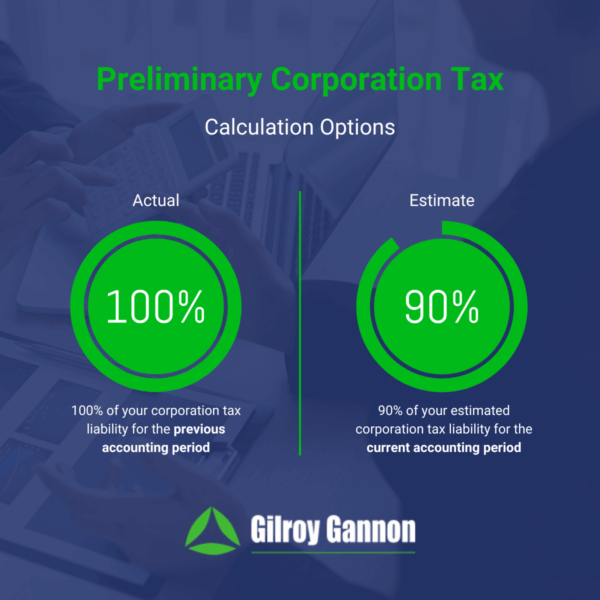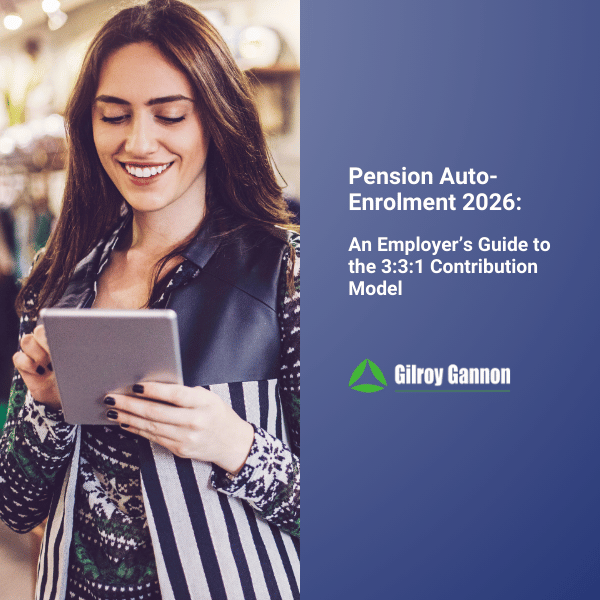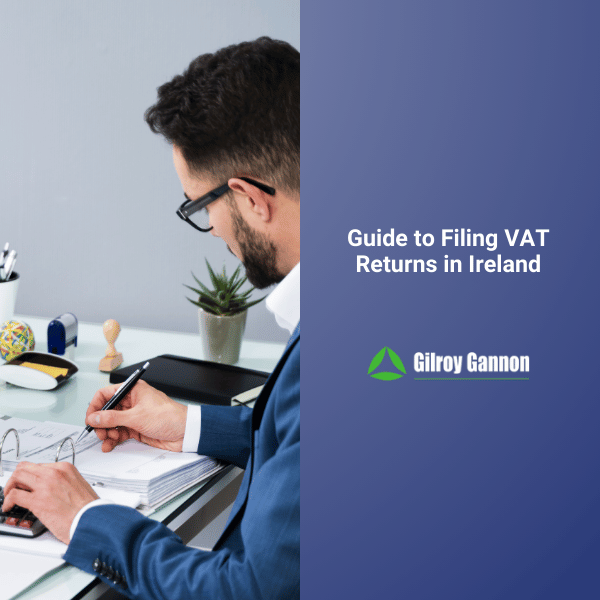What is Preliminary Corporation Tax and When is it Due?

Preliminary corporation tax is an area of the Irish tax system that generates a lot of questions. We are often asked what preliminary corporation tax is and when is it due.
In this blog, we’ll explain all the rules around preliminary corporation tax, including what it is, who it applies to, when it is due, and how much you have to pay. We’ll also give you tips and advice to help you stay on top of your preliminary corporation tax obligations.
What is Preliminary Corporation Tax?
Preliminary corporation tax is an advance payment of corporation tax. It is based on an estimate of what you think your corporation tax liability will be for the current year. You have to pay it before the end of your current accounting period.
Essentially, it’s paying your corporation tax (or most of your corporation tax) upfront.
Who Has to Pay Preliminary Corporation Tax?
Individuals who file income tax returns, as well as companies, have to pay preliminary tax. This blog is focused on companies and corporate tax.
The types of companies that have an obligation to pay preliminary corporation tax include:
- Resident companies that trade in Ireland
- Non-resident companies that trade in Ireland through an agency or branch
- Non-resident companies that make profits from rental property in Ireland
How Much Preliminary Corporation Tax Do I Have to Pay?
How much preliminary corporation tax you have to pay depends on your estimated corporation tax liability for the current accounting period. There are two options for doing your calculation:
- 100% of your corporation tax liability for the previous accounting period
- 90% of your corporation tax liability estimate for the current accounting period

Estimating your corporation tax liability for the current accounting period can be tricky, and there can be penalties if you underestimate and then underpay. As a result, many companies choose the first option.
When Is Preliminary Corporation Tax Due?
When preliminary corporation tax must be paid depends on whether you are a small company, a large company, or a start-up.
Small Companies
Small companies are companies that had a corporation tax liability of less than €200,000 in the previous accounting period.
If you qualify as a small company, you will need to pay preliminary corporation tax in one instalment before the 23rd day of the 11th month of your accounting period. Here’s an example:
- Current accounting period ends on 31 December
- Preliminary corporation tax must be paid by 23 November
Large Companies
Large companies are companies that had a corporation tax liability that was more than €200,000 in the previous accounting period.
If you qualify as a large company, your preliminary corporation tax must be paid in two instalments (provided your current accounting period is longer than seven months).
The first instalment must be paid by the 23rd of the sixth month of your accounting period. The second instalment must be paid by the 23rd of the 11th month of your accounting period. Here’s an example:
- Current accounting period ends on 31 December
- First instalment due by 23 June
- Second instalment due by 23 November
The amount you pay in your first instalment can be one of two options:
- 50% of your corporation tax liability for the previous accounting period
- 45% of your estimated corporation tax liability for the current accounting period
The amount you pay in the second instalment must bring the total amount paid to at least 90% of your estimated corporation tax liability for the current accounting period.
Start-Up Companies
Start-up companies with an estimated corporation tax liability that is less than €200,000 don’t have to pay preliminary corporation tax for the first accounting period of trading.
What Happens If You Get Preliminary Corporation Tax Wrong?
The Revenue may apply interest (charged at a daily rate) and penalties if you do not pay preliminary corporation tax on time or if you don’t pay enough.
Preliminary Corporation Tax Tips and Advice

- Start planning early – start planning for preliminary corporation tax at the beginning of your accounting period to ensure you stay on top of your estimates, payments, and obligations.
- Regularly set aside funds – regularly setting aside funds to pay preliminary corporation tax will ensure you don’t face financial challenges as you get closer to the payment due date.
- Regularly review your position – make adjustments throughout the year to ensure you are paying the correct amount and that you have sufficient funds available by the due dates.
- Pay on time – avoid costly interest charges and penalties by paying your preliminary corporation tax by the due dates.
- Get professional support and advice – a chartered accountant will help you understand your obligations, plan your finances, optimise your corporation tax position, and adhere to preliminary corporation tax payment deadlines.
Support from Gilroy Gannon
At Gilroy Gannon, our tax and business advisors can help you stay on top of preliminary corporation tax and all your other business tax obligations. Get in touch to arrange a consultation.
Latest Blog
Check out our blog and you will get the latest news, events, and financial tips from Gilroy Gannon.









